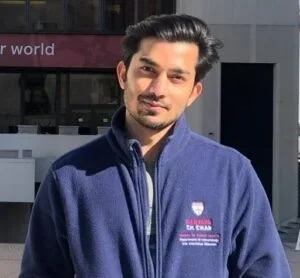India Research Center
The India Research Center, based in Mumbai, serves as a hub for Harvard Chan School’s research projects, educational programs, and knowledge translation and communication work across India.
Dextrus, 6th floor,
Peninsula Towers,
Peninsula Corporate Park,
Lower Parel, Mumbai 400013
India
‘Identification of histone lactylation in Plasmodium falciparum as an epigenetic marker of disease severity’ by Dr Manish Kumar
Lactic acidosis or lactic acid build up in the bloodstream of human host is a known clinical feature of severe malaria and is associated with mortality. However, it is unclear how the parasite responds to this lactic acid build up. In vitro studies have shown that parasitic proliferation in human red blood cells, conversion to transmissible sexual forms and antigenic variation are altered in response to the environmental lactate levels. In his research, Dr Kumar has identified that parasitic nuclear proteins such as histones are sensitive to lactate levels and can undergo a modification known as histone lactylation, which can potentially alter the gene expression in P. falciparum parasites. Dr Kumar intends to investigate the host lactate levels and its impact on the parasitic histone lactylation status in severe and non-severe malaria infections.

Dr Kumar is a postdoctoral fellow in the Duraisingh laboratory at the Harvard T.H. Chan School of Public Health, with experience in investigating epigenetic mechanisms in Plasmodium falciparum. He carried out his PhD work at the Institute of Bioinformatics, Bangalore, India where he learned advanced tandem mass spectrometry techniques to study quantitative proteomics and protein post-translational modifications. At Duraisingh laboratory, he is using his expertise to understand the epigenetic regulation of the malaria parasite through histone modifications.
So far, Dr. Kumar has measured the blood lactate levels in the severe and non-severe malaria samples at Goa Medical College, Goa, India and observed significantly higher levels of lactate in the patients with severe malaria as compared to the patients with non-severe malaria. Parasites from both severe and non-severe cases were then isolated and subsequently processed at Yenepoya University for further quantitative estimation of histone lactylation levels through comparative proteomics. The samples are being analyzed on high resolution mass spectrometer and the outputs of the study will be shared later this year. A successful outcome of the study will establish a link between the host lactate levels and parasitic histone lactylation status. Such interplay between the host metabolic state and the parasite’s epigenetic code may enable the parasite to alter its life cycle in response to the metabolic challenges encountered during the course of human infection.